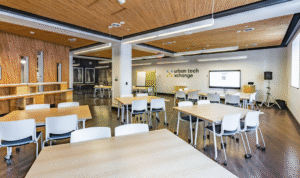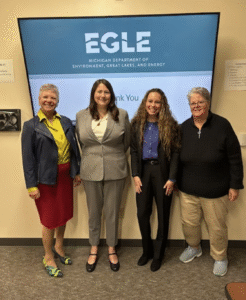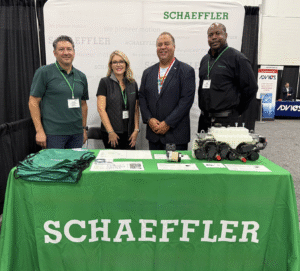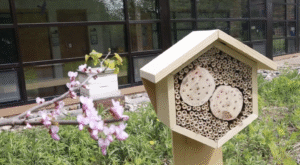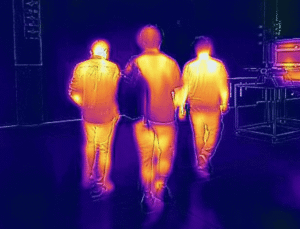
- Kim Kisner
- Business
- 10/22/2024
Detroit Nonprofit Drives Toward a Closed-Loop Food System
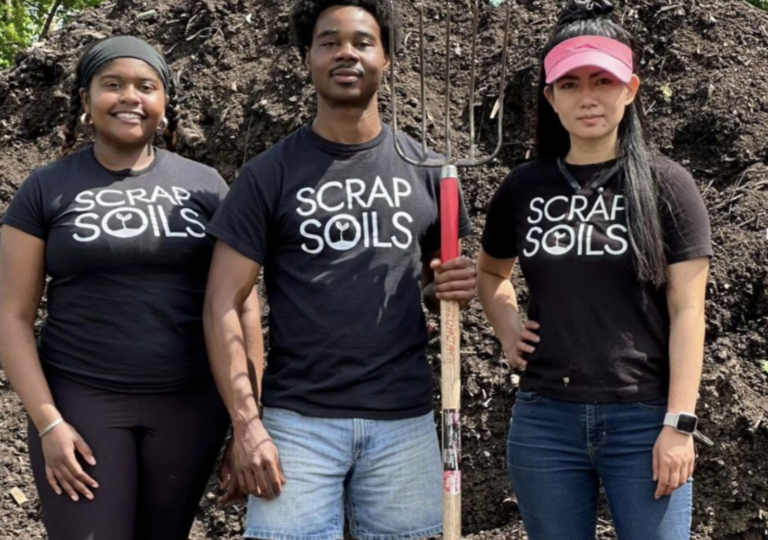
Scrap Soils is a Detroit-based nonprofit composting organization, focused on diverting food waste from landfills and transforming it into nutrient-rich compost. Scrap Soils partners with entities like Sanctuary Farms to promote sustainable food waste recovery, helping businesses and residents meet zero-waste goals. Its mission is to divert food waste from landfills, thus reducing greenhouse gas emissions and creating a sustainable local food cycle through composting.
In 2023, Scrap Soils piloted a robot program in the Transportation Innovation Zone with support from the city’s Office of Mobility Innovation. The program used an autonomous robot for food waste collection to explore more sustainable and efficient ways of managing and transporting waste.
SBN Detroit talked to Scrap Soils co-founder Ricky Blanding about the pilot program, and composting in Detroit.
Q: How did you develop the idea for Scrap Soils? What was the driving force behind it?
A: I was working at the Whitney and also developing a deep interest in gardening. I began to recognize the immense value of composting in improving soil quality. At the same time, I noticed a significant issue with food waste — there was a clear gap between the waste generated and how it could be utilized productively. So the concept of Scrap Soils emerged from this realization. Composting can serve as a key tool in addressing food waste, turning it into something beneficial for the environment, businesses, and communities alike.
Q: In what ways does composting help businesses and the community meet their zero-waste goals?
A: Composting gives businesses a sustainable alternative for managing their food waste. Many companies are simply throwing food away because they may not have other options available to them, and what we aim to do is close that food loop.
By offering businesses an opportunity to compost, we ensure that the resources they are using — and paying to dispose of — are put back into a healthier and more sustainable food system. This creates a more robust solution for food waste recovery and helps businesses and residents alike see the value in contributing to a circular economy.
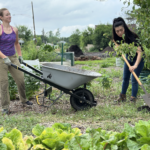
Q: What are some of the partnerships you’ve established with local businesses and other organizations?
A: Our primary farm partner is Sanctuary Farms, and through that relationship, we’re looking at expanding partnerships with multiple farms to broaden our reach. We’re particularly focused on districts 4, 5, and 6 in Detroit.
We’re also working closely with the West Village Business Association—West Village is where our home base is, and we want to be impactful in that community.
Beyond that, we’ve partnered with The Schvitz, AAA, and Renaissance High School. Each of these partnerships helps us connect with different parts of the community to extend our mission of food waste recovery. We are still very new and see growth on the horizon.
Q: How do you think getting businesses on board to compost contributes to Detroit’s broader sustainability efforts, particularly in terms of reducing the city’s waste footprint?
A: First, composting will reduce the amount of food waste going to landfills by closing the food loop through composting.
But beyond the practical aspects, there’s a larger goal of shifting the overall mindset within the community and the city. Our mission isn’t just about waste — it’s about inspiring people to care more about their environmental impact. When you get businesses and individuals thinking about closing the food loop and diverting food waste, they typically start to think about other ways in which they can address sustainability.
Q: What educational initiatives are you implementing to inform the community about composting and sustainability?
A: Education is key. This summer, we collaborated with Renaissance High School to run a summer cohort program, where a group of students helped us fundraise for Scraps Soils.
They learned essential skills like grant writing, networking, and fundraising, as well as the broader importance of composting. It’s not just about teaching them how to compost—it’s about giving them ownership over the future of sustainability in Detroit.
Q: Do you have data on the amount of food waste diverted from landfills through your composting services?
A: During our pilot program, we successfully composted 11,000 pounds of food waste. While we’re still compiling numbers for 2024, we are steadily growing, and over the next 6 to 12 months, we expect to see even more progress. Currently, we have just under 50 members, but the trajectory is promising, and we’re expanding at a consistent pace.
Q: How did the idea for using a robot to collect food waste come about, and what were the primary objectives of the pilot program?
A: The concept of composting and mobility intersecting is interesting. Managing trucks for food waste collection is expensive and resource-heavy, so we began to wonder if there might be more efficient ways to transport food waste.
Detroit is a leader in mobility innovation, so it seemed like the perfect place to test this. The pilot program has allowed us to gather data and see how technology could streamline food waste collection in the future.
Q: What were the environmental benefits of replacing traditional waste collection methods with a robot in terms of reducing emissions?
A: A clear benefit is the reduction in emissions by eliminating the need for traditional trucks and the people and resources required to operate them. The robot helped us centralize the movement of food waste, removing the middleman and making the process more autonomous.
We’re still analyzing the full impact of the pilot program, but it’s clear that mobility innovations like this can play a role in creating a more sustainable system.
Q: How do you see technology shaping the future of waste management and composting in Southeast Michigan?
A: We’re constantly learning about the evolving nature of mobility and how it connects to waste management. Looking ahead, I envision diversifying the types of vehicles we use and where the food waste ultimately goes.
The city has been very engaged in observing the impact of our program, and we’ve gained valuable insights into how technology can support composting efforts. By aligning with Detroit’s broader goals around mobility, we’re contributing data and knowledge that could guide future innovations in waste management. This is just one part of our broader strategy to scale our operations and continue leading in sustainability.
Q: What are some of the challenges you face in running Scrap Soils?
A: One of our main challenges is that we are a volunteer-led organization, which makes fundraising crucial. As a grassroots operation without startup capital, we are navigating the challenge of scaling up while relying heavily on our mission to drive support.
Another challenge lies in educating both our team and the broader community. We’ve made strides in securing financial partnerships and advisory support, but there’s still a lot of work to do to fully build out our resources and expand our impact.
Be sure to subscribe to our newsletter for regular updates on sustainable business practices in and around Detroit.
Kim Kisner
- All
- Business
- Community
- Education
- Events

Founded in 1965, Gensler is a global architecture and design firm working across sectors including urban development, commercial real estate, and civic infrastructure. SBN Detroit sat down with Najahyia Chinchilla, senior associate and sustainability consultant, to discuss mass timber, embodied carbon, and what sustainable construction means for Southeast Michigan. Q: Why is wood re-emerging right now as a serious option for large-scale, urban construction? A: Mass timber blends strength, sustainability, and design quality in ways few materials can. Wood has...
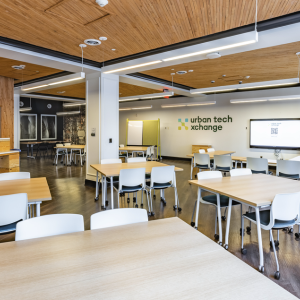
Now in its fourth year of operation, Urban Tech Xchange (UTX) has become a living laboratory where emerging technology startups can test, refine, and validate smart urban systems in real-world conditions. Launched through a collaboration between Bedrock, Bosch, Cisco, and Kode Labs, UTX builds on the foundation of the Detroit Smart Parking Lab (founded earlier by Bedrock, Ford, MEDC, and Bosch) expanding its scope beyond parking into logistics,...
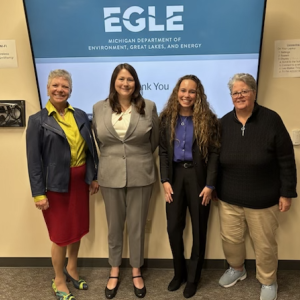
Butzel is one of Michigan’s longest-standing law firms, advising businesses across industries on regulatory compliance, environmental law, and complex commercial matters. As environmental expectations evolve alongside shifting regulatory realities, the firm plays a key role in helping companies navigate both legacy challenges and emerging risks. SBN Detroit interviewed Butzel shareholder Beth Gotthelf to discuss how environmental compliance, sustainability, and innovation are intersecting today — particularly in Southeast Michigan...


